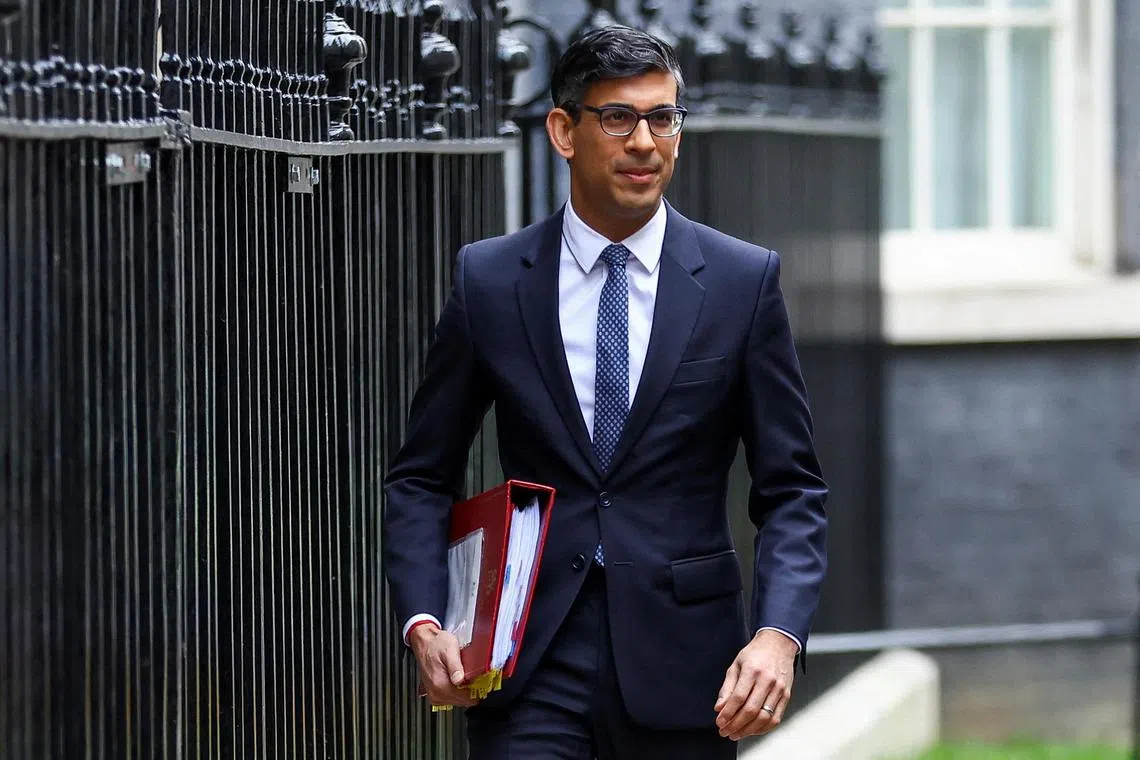Despite opposition, UK’s Sunak wins post-Brexit trade vote in Parliament
Sign up now: Get ST's newsletters delivered to your inbox

British Prime Minister Rishi Sunak is set to win parliamentary approval for a key element of a post-Brexit deal.
PHOTO: REUTERS
Follow topic:
LONDON - British Prime Minister Rishi Sunak won the backing of Parliament on Wednesday for a key element of a reworked post-Brexit deal on Northern Ireland despite a lack of support from the province’s biggest unionist party and some of his lawmakers.
Mr Sunak has tried to end years of wrangling over Brexit by revisiting one of the trickiest parts of the negotiations – to ensure smooth trade to Northern Ireland
He agreed with the EU to introduce the “Stormont brake”, aimed at offering Northern Ireland more control over whether to accept any new EU laws, as part of the so-called Windsor Framework of measures to soothe post-Brexit tensions.
But in Wednesday’s vote in the lower house of Parliament, those he most wanted to win over – Northern Ireland’s Democratic Unionist Party (DUP), Conservative eurosceptics in the European Research Group (ERG) and his two predecessors Boris Johnson and Liz Truss – said they would rebel.
Despite the opposition, Mr Sunak won the vote by 515 to 29, suggesting that several in his Conservative Party had abstained on the vote.
Mr Sunak and his ministers had urged lawmakers to support the brake.
“The Stormont brake is at the heart of the (Windsor) Framework,” Northern Ireland minister Chris Heaton-Harris told Parliament ahead of the vote. “It restores practical sovereignty for the United Kingdom as a whole and the people of northern Ireland in particular.”
The brake enables Britain to prevent new EU laws applying to goods in Northern Ireland if asked to do so by a third of lawmakers in the province’s devolved legislature.
The ERG has described the measure as “practically useless” and the DUP has complained that it does not apply to existing EU law.
‘Brake with no brake pads’
The new agreement was hammered out by Mr Sunak, in office since last October, after Mr Johnson’s former government threatened to renege on the original deal it had struck with the EU.
A hard border risked endangering the Good Friday Agreement which largely ended three decades of armed conflict in Northern Ireland involving militants seeking a united Ireland, “loyalists” wanting to remain part of the United Kingdom, and British security forces.
The United States has said that any threats to the agreement could hurt the possibility of a US-British trade deal.
Mr Sunak hailed securing the deal last month as a “decisive breakthrough”.
The agreement would ease post-Brexit trade between Britain and Northern Ireland, firmly root the province’s place in the United Kingdom and give lawmakers there a say in whether they must implement EU law.
But the DUP has said the new deal does little to ease its concerns over the post-Brexit trading arrangements, saying the “brake does not deal with the fundamental issue which is the imposition of EU law”.
The Northern Irish party, at odds with opinion polls suggesting 45 per cent of voters in the province support the framework versus 17 per cent opposed, has said it will keep talking to the government to try to assuage its concerns.
DUP leader Jeffrey Donaldson said his party could not return to Northern Ireland’s power-sharing government “at this stage”, a blow to Mr Sunak, who wants the assembly to be up and running.
Earlier, the ERG’s chairman Mark Francois told reporters the group had recommended to its members to vote against the government to show their discontent over what he called an “oversold” agreement that was a “brake with no brake pads”.
After the ERG published a legal document rubbishing most of the measures contained in the Windsor Framework, former prime minister Johnson, the face of the campaign to leave the EU, and his successor, Ms Truss, said they would vote against the brake.
Mr Johnson doubled down on his view that Mr Sunak should stick to his policy of standing by legislation which would tear apart the current deal with the EU.
“The proposed arrangements would mean either that Northern Ireland remained captured by the EU legal order ... or they would mean that the whole of the UK was unable properly to diverge and take advantage of Brexit,” he had said. REUTERS

